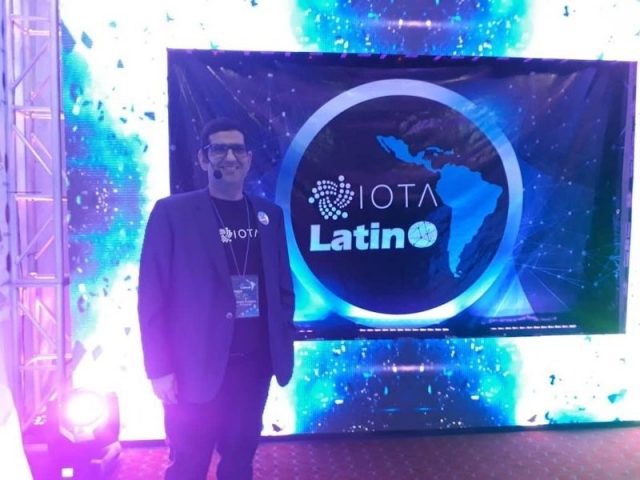
IOTA, the Internet of Things cryptocurrency, has made major inroads into Germany, but Latin America may be its next site of expansion. In a recent Venezuelan meetup, IOTA Latino was able to lay out its vision for Internet of Things and decentralized technology. The reception was enthusiastic, but why would IOTA prioritize Venezuela?
Venezuela is a hotbed for cryptocurrency interest. For Venezuelans, cryptocurrency isn’t some speculative interest. Venezuela’s Sovereign Bolivar (the national currency traded against the US Dollar) has suffered from hyperinflation, seeing its buying power reduced by more than 1,000,000% in 2018 alone.
With the Bolivar effectively worthless, Venezuelans have been buying up relatively stable digital currencies like Bitcoin and, more than any other, DASH. These decentralized, borderless currencies remain outside the reach of incompetent national banks and have allowed thousands of Venezuelans to stay afloat at a time when fiat money ceases to be useful.
IOTA smart contract solutions see Venezuela’s dire straights as an opportunity for many reasons. Any or all of these factors could contribute to an IOTA bull run as MIOTA, long valued for its utility value, becomes increasingly used as currency.
MIOTA as a Finite Currency Asset
MIOTA is not normally used as money, at least not in the same way as Bitcoin. MIOTA is meant to facilitate transactions upon the IOTA Tangle. Transactions herein are so numerous, efficient and affordable that there is no cost to the end user.
Nonetheless, MIOTA is finite, has value and can be used for exchange when vendors choose to accept it. Users within the Venezuelan market can buy IOTA and transfer it instantaneously – and without the high costs sometimes associated with Bitcoin or DASH. Therefore, even though it’s not primarily a currency, MIOTA can perform well in this function in a pinch. Venezuela is most certainly in a pinch.
Whenever people buy up a finite resource, the price of each individual unit is increased because of supply and demand. Enthusiasm within Venezuela about IOTA could spark a bull run.
IOTA Latino – Eliminating Friction in Chaotic Markets
One of IOTA’s primary functions is to eliminate friction in consumer transactions. “Friction” can be defined as any steps (financial or otherwise) which a consumer must perform in order to use a technology. Friction might rear its ugly head when you forget your bank web account password, for example.
There is perhaps no more frictive currency market on Earth than Venezuela’s. That citizens cannot depend on the Bolivar to pay for food and shelter is a rift in the Venezuelan social contract. Without making any investment within Venezuela, IOTA already has a system that works better than the one issued by the Venezuelan state. If Venezuelans widely agree, this could bring millions of new users into the IOTA fold.
Venezuela’s Advantages of Backwardness
Perhaps the only real benefit of a social catastrophe is the opportunity to start again with a blank slate. Venezuela’s infrastructure is collapsing. Currently, credit and debit cards are useless in much of Venezuela. This is a major market void.
Economies like the United States are slow to accept cryptocurrency networks as payment channels. After all, there are existing systems which work pretty well. This can no longer be said in Venezuela, where parodies of leftist financial ideology have created broken economic systems that would have made Karl Marx vote with the capitalists.
IOTA partnerships prove it can create real infrastructure. Venezuela’s market void may represent a ground floor from which new modern Smart Economy systems can be built. Chaos cannot reign in Venezuela forever. The efficient economic systems that define its future could well be built using decentralized identity infrastructure like IOTA’s data marketplaces.
Social Disenchantment With Nationalized Systems
In a country where the national army has been mobilized against citizen protestors, civilian confidence in the federal government is low. President Maduro may or may not long cling to power in Venezuela, but trust in state-governed systems is forever damaged.
When economic systems like money work well, citizens don’t have to understand very much about them. When economic systems fail, citizens become very sophisticated. This is why Venezuela’s people know more about Bitcoin than the people of most other countries; many of them depend upon it for their survival! IOTA’s meetup proves that the IOTA Foundation can speak directly to the Venezuelan population, and that these people are ready to listen.
IOTA Latino’s vision for Venezuela may start from the grassroots, but its effects could transform this horribly challenged nation and spark a bull run for MIOTA in the process.
*Information in this article is the writer’s own opinion and should not be taken as investment advice.
The post Will Venezuela Kick Off a Bull Run for IOTA (MIOTA)? appeared first on The Independent Republic.

Theindependentrepublic.com is author of this content, TheBitcoinNews.com is is not responsible for the content of external sites.
Our Social Networks: Facebook Instagram Pinterest Reddit Telegram Twitter Youtube










